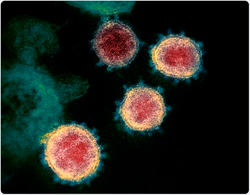As ambiguous as this headline is, the facts are very clear – Covid-19 can be caught more than once and a vaccine against the virus is looking even further away according to world leading Virologists.
 Several news agencies around the world, including Reuters, have reported that people in Hong Kong and mainland Europe have been found to have been infected with Covid-19 twice, albeit with a different strain of the virus! That in itself poses difficult questions to answer.
Several news agencies around the world, including Reuters, have reported that people in Hong Kong and mainland Europe have been found to have been infected with Covid-19 twice, albeit with a different strain of the virus! That in itself poses difficult questions to answer.
Reuters and The New Paper confirmed the European cases as being from
the Netherlands where an elderly patient has tested positive for coronavirus after already beating it once, Dutch broadcaster NOS cited virologist Marion Koopmans as saying.
In Belgium, a female patient contracted COVID-19 for the first time in March and a second time in June, broadcaster VRT reported.
The reports have raised concerns that Coronavirus patients may only have short-lived immunity to infection, and that is a serious complication for any vaccine that may be developed. Vaccines work by stimulating infection in the body which then results in the body’s immune system producing anti-bodies which then kill the virus e.g. Influenza. Not knowing which strain is prevalent in the wild, will result in the vaccine being of no use in fighting the subsequent disease caused by the virus.
However, Ms Koopmans, an adviser to the Dutch government, is quoted as saying: "That someone would pop up with a re-infection, it doesn’t make me nervous. We have to see whether it happens often.”
Meanwhile, Belgian virologist Marc Van Ranst told Belgian broadcaster VRT he had not been surprised by the Hong Kong re-infection.
"For us it was not news because we have also had such a case in Belgium," he told the Terzake programme.
Professor Van Ranst said in cases like the one of the Belgian woman, in which the symptoms were relatively mild, the body may not have created enough antibodies to prevent a re-infection, although they might have helped limit the sickness.
Further details of the Hong Kong case was reported by the UK’s Daily Telegraph on Tuesday (25th August 2020) which stated that:
‘Researchers at the University of Hong Kong sequenced the virus in a healthy man, who tested positive twice at airport screenings four and half months apart, and found he had been infected with two different strains.
The Chinese scientists said it showed that long-term immunity cannot be guaranteed, and that people who have already had the virus still needed to comply with social distancing, wearing masks and vaccination.’
 The newspaper article went on to quote Dr David Strain, Clinical Senior Lecturer, at the University of Exeter and chair of the British Medical Association’s Medical Academic Staff Committee, as responding to the news reports, saying;
The newspaper article went on to quote Dr David Strain, Clinical Senior Lecturer, at the University of Exeter and chair of the British Medical Association’s Medical Academic Staff Committee, as responding to the news reports, saying;
“This is a worrying finding for several reasons. It suggests that previous infection is not protective and it raises the possibility that vaccinations may not provide the hope that we have been waiting for. If antibodies don't provide lasting protection, we will need to revert to a strategy of viral near-elimination in order to return to a more normal life.”
However, some experts believe that a rare case of re-infection with a different strain was to be expected with such a globally spread virus
Brendan Wren, Professor of Microbial Pathogenesis at the London School of Hygiene & Tropical Medicine, said:
“With over 3 million cases of Covid-19 worldwide, the first reported case of a potential re-infection with Coronavirus needs to be taken into context. It appears that the young and healthy adult has been re-infected with a slight SARS-CoV-2 variant from the initial infection. It is to be expected that the virus will naturally mutate over time.”
Dr Simon Clarke, Associate Professor in Cellular Microbiology at the University of Reading, responded by saying that these cases are more likely to be re-infections with the virus not having been obliterated by their body’s immune system, The Daily Telegraph reports:
“The significant thing here is that being re-infected with a mutated strain demonstrates that it is more likely to be re-infection, rather than the same infection that has hung around because the virus has not actually been got rid of, as some people have suggested happens.
“The finding of a mutant strain is absolutely nothing to be shocked or surprised by. It would actually be more interesting if there were no mutations cropping up.”
Source: The New Paper / Reuters / The Daily Telegraph